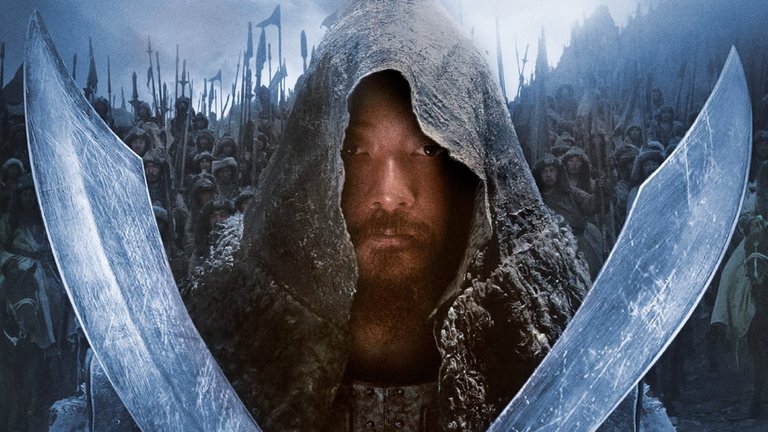
Genghis Khan, known for his unparalleled conquests that resulted in the death of an estimated tenth of the world's population and his dominion over a quarter of those who survived, stands as history's greatest conqueror. His life has captivated the imaginations of writers and artists for centuries, inspiring countless interpretations across various mediums, including film. However, many cinematic portrayals—particularly in Western cinema—have often fallen short of capturing the complexity and grandeur of his character. This is starkly illustrated by past depictions featuring white actors, such as John Wayne and Omar Sharif, which tend to lack authenticity. In contrast, Mongol, the 2007 epic directed by Russian filmmaker Sergei Bodrov, offers a far more genuine and spectacular representation of Genghis Khan’s life than its predecessors.
Mongol chronicles the formative years of Genghis Khan during a time when the Mongols were merely a collection of nomadic tribes inhabiting the steppes of modern-day Mongolia. The narrative begins in 1172, focusing on Temujin (portrayed by Odnyam Odsuren), the nine-year-old son of Yesugëi (played by Ba Sen), the leader of the Borjigin tribe. Following Yesugëi’s poisoning, power falls into the hands of his lieutenant Targutai (played by Amadu Mamadakov), who perceives young Temujin as a threat. Consequently, Temujin is forced to flee into the wilderness, where he meets Jamukha (played by Amarbold Tuvshinbayar), a boy from a rival tribe who saves his life and becomes his blood brother. As they grow older, adult Temujin (played by Tadanobu Asano) and Jamukha (played by Sun Honglei) lead their respective tribes. Their alliance is crucial for Temujin’s efforts to rescue his beloved wife Börte (played by Chuluuny Khulan), who has been abducted by the Merkits. However, jealousy arises within Jamukha as he grows envious of Temujin's rising charisma and popularity. This tension culminates in Jamukha capturing Temujin and selling him into slavery within the West Xia (Tangut) Empire, where he endures years of hardship until Börte rescues him. This ultimately sets the stage for Temujin’s campaign to unite the Mongol tribes.
Bodrov and co-writer Arif Aliyev based their screenplay on limited written records from the early 13th century, alongside various oral traditions and modern historiographic works that depict Genghis Khan as a visionary leader that brought peace and stability among feuding tribes rather than a mere bloodthirsty conqueror.
By focusing on Genghis Khan's early years, Bodrov crafts a compelling "rags-to-riches" narrative that resonates with audiences. The film intertwines this journey with a poignant love story between young Temujin and Börte. At times, Temujin’s tale resembles a Western adventure more than a grand historical epic; it is only towards the film's climax—when Temujin confronts Jamukha in an epic battle—that viewers are treated to spectacle reminiscent of Hollywood blockbusters.
Filmed across breathtaking landscapes in Kazakhstan and Inner Mongolia, Mongol reflects Bodrov's commitment to authenticity regarding Mongolian customs, religion, and lifestyle. The dialogue is delivered in Mongolian, immersing viewers in the cultural context that shaped Temujin into a formidable leader. The cinematography by Sergei Trofimov and Rogier Stoffers enhances this authenticity by capturing the vastness of untouched land that serves as an evocative backdrop for this epic tale.
Accompanying this visual grandeur is a soundtrack composed by Finnish musician Tuomas Kantelinen, which draws upon traditional Mongolian motifs. The combination of stunning visuals and emotive music creates an atmosphere that elevates Mongol beyond mere historical retelling into an immersive cinematic experience.
Unlike many Western historical epics that often feature predominantly Caucasian casts, Mongol boasts an entirely Asian ensemble that is nevertheless diverse, featuring Japanese actor Tadanobu Asano as Temujin and Chinese actor Sun Honglei as his friend and future rival.
Mongol received positive reviews from critics who praised it as one of those rare historical epics that Hollywood no longer produces. It won Russia's prestigious Nika Award and performed impressively at the box office. Critics noted its ability to convey both spectacle and emotional depth while remaining grounded in its cultural context.
However, despite its accolades, Mongol is not without flaws. Bodrov faced challenges in encapsulating Genghis Khan's expansive life within a single feature film; he originally envisioned it as part one of a trilogy. Consequently, the film concludes before dealing with Khan’s infamous conquests, leaving audiences with an incomplete narrative arc.
Despite this, Mongol remains an impressive piece of cinema that should be recommended to fans of historic epics and period adventures alike.
RATING: 7/10 (+++)
Blog in Croatian https://draxblog.com
Blog in English https://draxreview.wordpress.com/
InLeo blog https://inleo.io/@drax.leo
Hiveonboard: https://hiveonboard.com?ref=drax
Rising Star game: https://www.risingstargame.com?referrer=drax
1Inch: https://1inch.exchange/#/r/0x83823d8CCB74F828148258BB4457642124b1328e
BTC donations: 1EWxiMiP6iiG9rger3NuUSd6HByaxQWafG
ETH donations: 0xB305F144323b99e6f8b1d66f5D7DE78B498C32A7
BCH donations: qpvxw0jax79lhmvlgcldkzpqanf03r9cjv8y6gtmk9
Posted Using InLeo Alpha